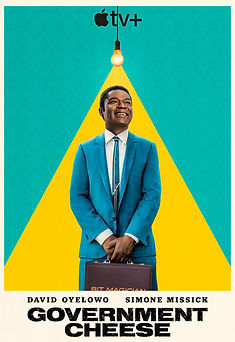GOVERNMENT CHEESE (2025)
"Hampton Chambers a newly released ex-convict striving to leave his criminal history behind and reunite with his family. Amidst this struggle, he grapples with frequent inexplicable moments of divine intervention."
OUR REVIEW:
The television shows that Apple TV+ produces have formed a surrealist identity. Silo, Severance, Shrinking, and even Ted Lasso carry the hallmarks of unconventional yet gripping experiences. Other streaming platforms offer such a ride, but Apple TV traffics primarily in this forum. When a company of this size has “f--- you” money, they simply are not interested in the status quo.
The company A24 has carved out a similar path, cutting against the grain with its catalog of original features. In other words, it’s become easier to recognize what you are signing up for. If you want something safe and simple, perhaps stick with Netflix. If you’re up for a challenge, log in to Apple.
Government Cheese, a ten-episode series about an ambitious ex-convict reintegrating into society, straddles the line between innovation and routine. It is a comedy that dabbles in dreamlike wonder and violent crime.
David Oyelowo stars as Hampton Chase, a recently released convict from Chino prison who attempts to leave his criminal history behind. He is motivated by divine inspiration, a byproduct of his 3-year prison sentence, to create an innovative industrial and technological invention. He also desires to reconnect with his wife Astoria (Simone Missick) and his two teenage sons Harrison (Jahi Di’Allo Winston) and Young Einstein (Evan Ellison).
While this show centers around Hampton’s attempt to sell a revolutionary self-sharpening drill bit and the pits he sinks into to make his dream a reality, the show allows the other characters to breathe and become interesting.
Astoria works as a secretary for a design company, yet she has her own creative designs and initially resents Hampton for going to prison, which hinders her ambitions. Resigning Hampton to stay in the garage upon his release, Astoria strides confidently in her independence. She raises her boys, courts a lover, and pursues her dream job as a designer and decorator. She also smartly calls out Hampton for attempting to put her back in the kitchen and be a homemaker upon his release. Missick, who is beautiful and stoic, portrays incredible agency instead of bowing to the patriarchal system.
The series is set in the late 1960s, and the Chase family is a black family in the San Fernando Valley suburbs, but the subject of race is never mentioned. I like this. There are cultural touchpoints regarding religion, especially a particularly funny episode inside a synagogue, and other sociopolitical commentary about family roles, morality, industry, ethics, and ambition. These beats are obvious but subtle in their delivery, sidestepping the oft-pushed markings of a woke agenda, instead tethering these moments to a character and their growth.
Hampton is an intelligent man with a goal to sell his invention while treading the precarious waters of parole and winning his family’s trust and love back. His older son, Harrison, smokes weed openly, cares about the environment and civil rights, and dismisses his father’s attempts at reconnection. The younger son, fittingly named Young Einstein, is more forgiving of his father but is aloof and ambivalent about what Hampton wants for him. Every member of the Chase family exudes high intelligence that materializes in their pursuits and the dicey family dynamics that Hampton’s return brings.
The crux of the season hinges on Hampton’s need to drum up money to sell his product while winning back his family. Simultaneously, Hampton is struggling to earn money to pay back the Prevost brothers – a French-Canadian gang of brothers – who helped secure Hampton’s early release. Hampton’s well-meaning but criminally opportunistic friend (Bokeem Woodbine) provides counsel to Hampton and perhaps a solution.
Government cheese, the subsidized dairy product generated and distributed to lower-income families during World War 2, is an appropriate title for this show. Like the cheap commodity it’s based on, this series is analogous to identity, particularly those of low socioeconomic status. Are we all mostly homogenized products of our environment, and what must we do to get a seat at the table instead of settling for the lowest possibility? Government Cheese sits on the outskirts of reality by a fraction, allowing a convergence of humor, grit, violence, and the American dream. It is surreal, dreamlike, funny, and can become downright farcical; it yields a better flavor than the namesake it’s based on, so good, you can believe its absurdity.

OUR VERDICT:
.png)
WHERE TO WATCH...
.png)








